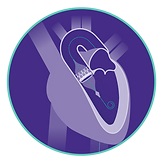For several years, Huntington Harbor resident Dennis Capilouto, 75, maintained annual appointments with his cardiologist, Amanda Donohue, D.O., to monitor the severity of his aortic stenosis – a narrowing of the aortic valve that restricts blood flow from the heart to the rest of the body. Though some patients, like Dennis, do not experience any symptoms, others have chest pain, shortness of breath during activity, dizziness, fainting, or a rapid, fluttering heartbeat. If left untreated, severe aortic stenosis can cause serious complications, including heart failure, stroke or death.
By 2021, Dennis’ disease had progressed in severity, and Dr. Donahue recommended a possible replacement of his aortic valve. He was referred to Sanjiv Patel, M.D., interventional cardiologist with the MemorialCare Heart & Vascular Institute at Orange Coast Medical Center, for a consultation.
Dr. Patel evaluated Dennis’ condition and agreed that his aortic valve should be replaced – but informed Dennis that he might not need open-heart surgery. Instead, he was an eligible candidate for a minimally invasive procedure called transcatheter aortic valve replacement (TAVR).
 Transcatheter aortic valve replacement
Transcatheter aortic valve replacement
During a TAVR procedure, a balloon catheter is threaded through a major artery and into the heart while it’s still beating. Instead of a metal mesh stent, the deflated balloon is covered by a collapsible aortic valve. The balloon is positioned across the diseased valve and inflated, pushing the replacement valve open and lodging it in place. The new valve begins working immediately.
Patients who undergo TAVR generally stay overnight in the hospital and go home the next day. Post-operation restrictions are few, but patients are enrolled in the hospital’s cardiac rehabilitation program to ensure a smooth recovery.
The 100th TAVR procedure
TAVR is a dual-specialty procedure, requiring the expertise of both an interventional cardiologist – who specializes in catheter-based procedures – and a heart surgeon. Rachel Hargrove, M.D., medical director of cardiac surgery at the MemorialCare Heart & Vascular Institute at Orange Coast Medical Center, evaluated Dennis’ case and met with the rest of the TAVR team to develop a comprehensive care plan.
On Aug. 12, 2021, Dennis became the 100th TAVR patient at MemorialCare Orange Coast Medical Center since the procedure was introduced in July 2019.
The 100th procedure is a milestone that we were proud to achieve. It reinforces our track record of excellent outcomes and our ability to treat exceptionally complicated heart and vascular cases.
Rachel Hargrove, M.D.
Given the complexity of the procedure, the team at MemorialCare Orange Coast Medical Center is committed to patient education, making sure patients understand every step and answering any questions that may arise. Dennis’ care team was by his side throughout the entire process, coordinating his care from consultation, through surgery, and to the end of his cardiac rehabilitation program.
“Dr. Hargrove and the team at MemorialCare Orange Coast Medical Center did a remarkable job,” Dennis enthusiastically shared. “I recovered with no problems or issues. I’m back to enjoying my life – exercising and spending time with my grandchildren.”
To learn more about TAVR, click here or call 844-934-TAVR (8287) to speak with a structural heart coordinator.
Minimally invasive procedures at the MemorialCare Heart & Vascular Institute at Orange Coast Medical Center
Together, the Structural Heart Program and the Surgical Heart Program at the MemorialCare Heart & Vascular Institute at Orange Coast Medical Center provide leading-edge, minimally invasive treatment options.
“I am looking forward to taking this program to even greater heights with leading-edge technology, resulting in exceptional patient outcomes,” said Sanjiv Patel, M.D., interventional cardiologist with the MemorialCare Heart & Vascular Institute at Orange Coast Medical Center.
Aside from the transcatheter aortic valve replacement (TAVR) procedure, the Institute also offers patent foramen ovale (PFO) and atrial septal defect (ASD) closure devices, which seal congenital openings between the two upper chambers of the heart.
“There is an outstanding level of collaboration between our interventional cardiologists, our cardiac surgeons and their team,” said Diane Ison, B.S.N., RN, coordinator of the Structural Heart Program at MemorialCare Orange Coast Medical Center. “As a result, the outcomes for our patients are outstanding as well.”
For more information about the MemorialCare Heart & Vascular institute at Orange Coast Medical Center, please click here.